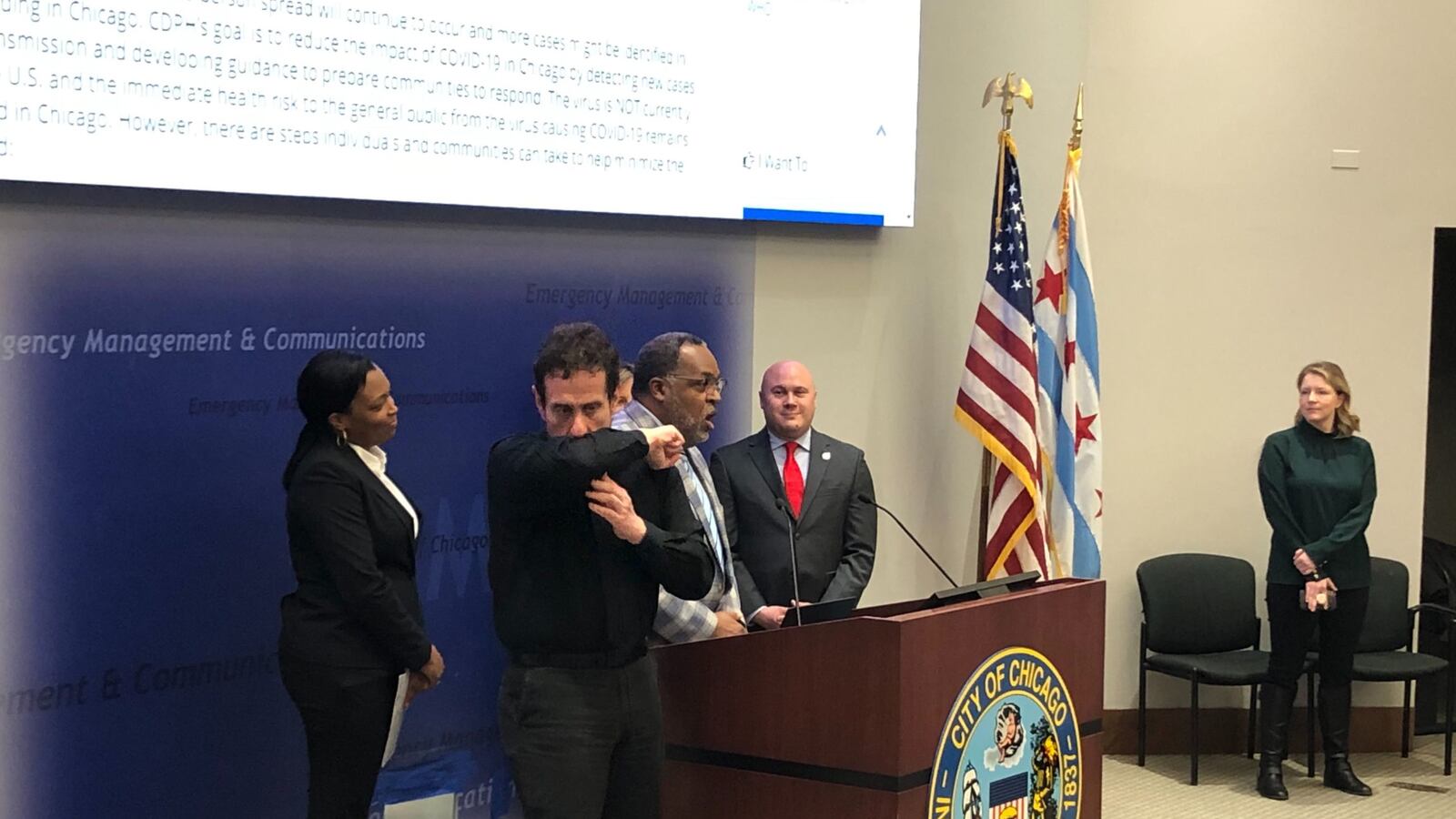With no more confirmed positive coronavirus infections in students or staff after a Chicago special education aide tested positive for the virus last week, Chicago has no plans to close any additional schools, district leadership said Tuesday.
But even so, Illinois said two of its newest cases of coronavirus were relatives of the Chicago special education aide. On Tuesday, state officials announced the total number of cases in Illinois has now climbed to 19, with eight additional diagnoses made in the past 24 hours that include the first two outside of Cook County. One of the new patients is a man in his late teens in McHenry County, but officials did not say whether he attends a high school or a higher education institution.
Another one of the new cases is a Chicago Public Schools parent, the district said in a letter to families Tuesday night. The parent contracted the virus while traveling abroad, the letter said, and “did not enter any CPS schools.” The health department did not recommend closure, the letter did not name the school, and family members will “self-quarantine,” it said.
Illinois and Cook County issued formal disaster proclamations on Monday.
The district on Monday closed Vaughn Occupational High School, where the aide worked. Chicago is developing a remote-learning plan should it widen school closures, and is encouraging families to update emergency contact information.
Chicago schools chief Janice Jackson appeared at a press conference Tuesday morning alongside the district’s Chief Health Officer Kenneth Fox and Jennifer Layden, deputy commissioner for the city’s health department. “We are planning for various scenarios,” Jackson said. “A few important steps that we have taken are noted: We have sent over 1 million emails over the weekend… we have also contacted members of the Vaughn student community to check on their well-being.”
The district will expand its effort to offer food aid and support to families of the 200-plus students from Vaughn. Authorities asked students, staff, and anyone else who visited Vaughn from Feb. 25 to isolate themselves through March 18.
The district will encourage Vaughn families, three-quarters of whom are low income, to pick up a box with three days’ worth of food from a district warehouse, and will coordinate food delivery to those without transportation, Jackson said.
The district will also offer families daily updates and will post information online at cps.edu/coronavirus. Chicago parents with questions may call the Healthy CPS hotline at 773-553-KIDS.
“The faculty and staff that work at these schools are some of the most dedicated and positive professionals that we have in our district, and our priority is to ensure they have the support and resources that they need during this challenging time,” Jackson said, noting that any quarantined staff would be paid.
Layden said that the fact that no additional infections have cropped up among the school community was a good sign. “We have had multiple people tested who have symptoms and have tested negative,” she said. She added that she believes current thinking is that exposure comes from prolonged and direct contact with an infected person.
According to the Centers for Disease Control and Prevention, the virus is thought to spread mainly between people who are in close contact with one another, through respiratory droplets from a cough or sneeze. It also may spread by people contacting infected surfaces or objects and then touching their mouth, nose, or possibly eyes.
Some COVID-19 patients in the United States have had no known exposure to an infected person nor had traveled to places where the virus has spread. Illinois reported over the weekend its first case of “community spread” of the virus.
Layden declined to say how many students and school employees have been tested. Some test results are pending. Health officials have said they are only testing people who show symptoms of the COVID-19 disease, which include fever, cough, and difficulty breathing.
The district also stressed that any decisions to close a school or further quarantine any students would be taken under advice from the Chicago Department of Public Health. “We should all be following the lead of the health officials,” Jackson said, expressing concerns about spreading misinformation. “They are the experts here.”
Here’s what else we know so far about Chicago’s response to coronavirus and how it could affect schools:
Closing a school is a complex decision. Read more here about the impact on Vaughn families so far.
Still, research shows school closures can slow the spread of illness. Read our research roundup here.
Coronavirus conversations are happening in the classroom. Here, one Indiana teacher explains how she’s addressing student fears.
School cleanliness is in the spotlight. Read here about how Chicago plans to deliver more cleaning supplies.
Parents have questions about who is susceptible. Here are 6 common questions and answers about Chicago’s response.
Federal officials have suggested districts should plan for remote learning. Here Chalkbeat explains why that’s a remote possibility for many urban districts.
There’s a renewed spotlight nationally on the role of school nurses. Read more here.
Other cities are grappling with tough questions, too, about when to close schools. Read the latest from our New York bureau here. That city has more than two dozen confirmed cases.

